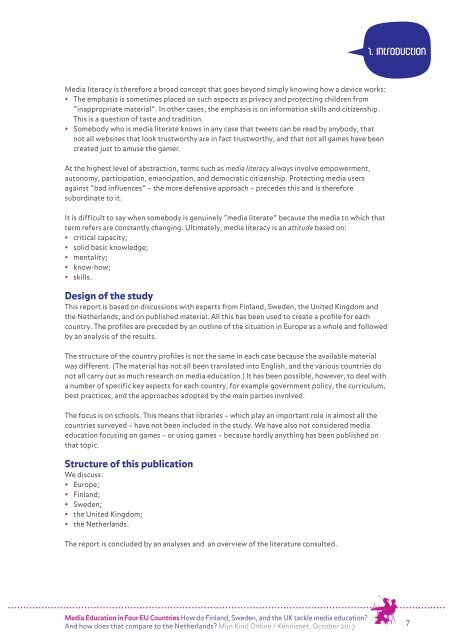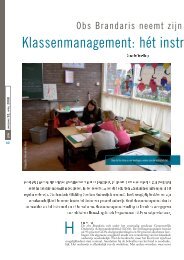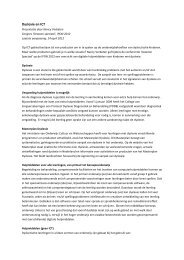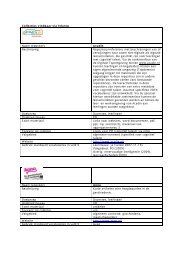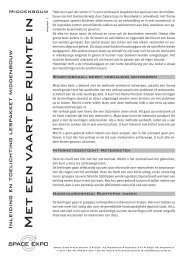Media education in Four eu countries - Kennisnet
Media education in Four eu countries - Kennisnet
Media education in Four eu countries - Kennisnet
You also want an ePaper? Increase the reach of your titles
YUMPU automatically turns print PDFs into web optimized ePapers that Google loves.
1. Introduction<strong>Media</strong> literacy is therefore a broad concept that goes beyond simply know<strong>in</strong>g how a device works:• The emphasis is sometimes placed on such aspects as privacy and protect<strong>in</strong>g children from“<strong>in</strong>appropriate material”. In other cases, the emphasis is on <strong>in</strong>formation skills and citizenship.This is a question of taste and tradition.• Somebody who is media literate knows <strong>in</strong> any case that tweets can be read by anybody, thatnot all websites that look trustworthy are <strong>in</strong> fact trustworthy, and that not all games have beencreated just to amuse the gamer.At the highest level of abstraction, terms such as media literacy always <strong>in</strong>volve empowerment,autonomy, participation, emancipation, and democratic citizenship. Protect<strong>in</strong>g media usersaga<strong>in</strong>st “bad <strong>in</strong>fluences” – the more defensive approach – precedes this and is thereforesubord<strong>in</strong>ate to it.It is difficult to say when somebody is genu<strong>in</strong>ely “media literate” because the media to which thatterm refers are constantly chang<strong>in</strong>g. Ultimately, media literacy is an attitude based on:• critical capacity;• solid basic knowledge;• mentality;• know-how;• skills.Design of the studyThis report is based on discussions with experts from F<strong>in</strong>land, Sweden, the United K<strong>in</strong>gdom andthe Netherlands, and on published material. All this has been used to create a profile for eachcountry. The profiles are preceded by an outl<strong>in</strong>e of the situation <strong>in</strong> Europe as a whole and followedby an analysis of the results.The structure of the country profiles is not the same <strong>in</strong> each case because the available materialwas different. (The material has not all been translated <strong>in</strong>to English, and the various <strong>countries</strong> donot all carry out as much research on media <strong>education</strong>.) It has been possible, however, to deal witha number of specific key aspects for each country, for example government policy, the curriculum,best practices, and the approaches adopted by the ma<strong>in</strong> parties <strong>in</strong>volved.The focus is on schools. This means that libraries – which play an important role <strong>in</strong> almost all the<strong>countries</strong> surveyed – have not been <strong>in</strong>cluded <strong>in</strong> the study. We have also not considered media<strong>education</strong> focus<strong>in</strong>g on games – or us<strong>in</strong>g games – because hardly anyth<strong>in</strong>g has been published onthat topic.Structure of this publicationWe discuss:• Europe;• F<strong>in</strong>land;• Sweden;• the United K<strong>in</strong>gdom;• the Netherlands.The report is concluded by an analyses and an overview of the literature consulted.<strong>Media</strong> Education <strong>in</strong> <strong>Four</strong> EU Countries How do F<strong>in</strong>land, Sweden, and the UK tackle media <strong>education</strong>?And how does that compare to the Netherlands? Mijn K<strong>in</strong>d Onl<strong>in</strong>e / <strong>Kennisnet</strong>, October 20137


